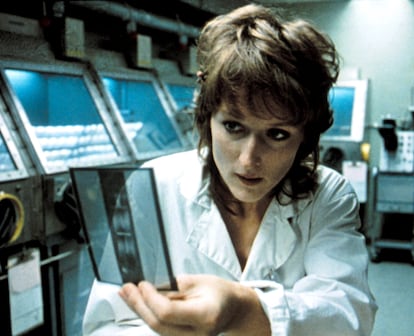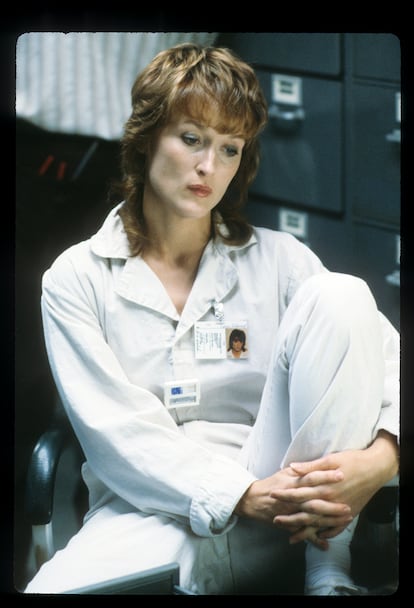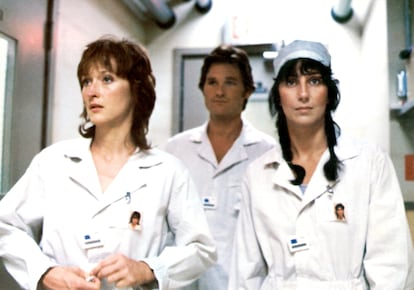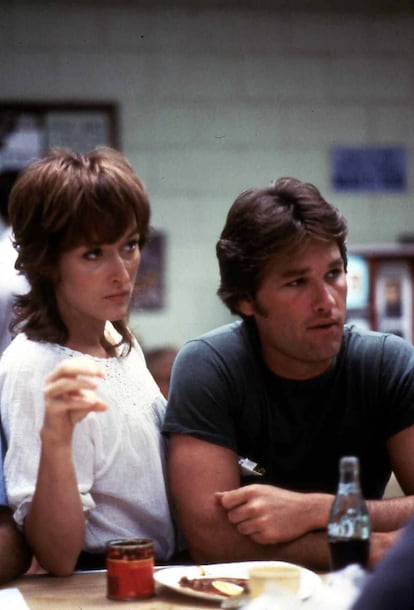Who killed Karen Silkwood, the antinuclear activist who made no apologies for not being an ‘exemplary mother’?
More than 40 years have passed since the release of the biopic about a lab technician who died in strange circumstances after denouncing negligence at the nuclear plant where she worked. With Meryl Streep and Cher as the leading duo, the film was a big hit

Karen Silkwood had been working as a laboratory technician for two years. The twenty-year-old, a native of Nederland in Texas, had always dreamed of being a scientist, but had to leave university when she married a young man from her town. After going down the aisle, they had three children together. The two separated seven years later due to her husband’s ongoing affairs and his financial debts. Silkwood left him custody of the children and went to Oklahoma, where she got her coveted job at Kerr-McGee, a nuclear fuel production company.
At Kerr-McGee, Silkwood was shocked by the company’s continued negligence and safety violations, which compromised the health of its employees. The young woman became a bold and vocal union activist, taking the case to the U.S. government in 1974. A couple of months after testifying, it was discovered that Silkwood had been exposed to plutonium in quantities higher than those considered to cause cancer. Plutonium was also found in the kitchen and bathroom of her apartment. Her commitment to safety even earned her the animosity of her colleagues, who did not want to lose their job. Barely 10 days after the plutonium contamination, when the activist was on her way to an interview with a reporter from The New York Times, carrying a folder with evidence that incriminated the company, her Honda Civic veered off the road and fell down a hillside. Silkwood, 28, died instantly.
The strange circumstances of her death only increased the media’s attention on the case. As a result of her death, her allegations had wider repercussions, with Silkwood being hailed as a “martyr.” The young woman’s family sued Kerr-McGee. They backed their lawsuit on three findings, reported on by The New York Times at the time: the car had fresh marks indicating it had been forced into the ditch, the bulky folder on Kerr-McGee disappeared, and several company executives were quick to appear at the scene of the accident, without it ever being clarified who notified them.
In response, Kerr-McGee argued that the young woman took tranquilizers and alcohol — traces were found in her blood — and that Silkwood was so obsessed to prove that she was right that she herself took plutonium pellets from the plant to contaminate her home. Although a court ruled in favor of the union leader’s heirs, an appeals court ended up overturning the win in 1981. The plant closed a year after the death of Silkwood, who was hailed as an international hero. But it is Meryl Streep’s face that now comes to mind when Silkwood is remembered.

More than 40 years have passed since the movie Silkwood hit cinemas in the United States. Directed by Mike Nichols of The Graduate fame, the film about the young woman’s life was a major success, but it was not without controversy. Starring Meryl Streep — who was on a hot streak after winning two Oscars for her roles in Kramer vs. Kramer and Sophie’s Choice — the film made three times its budget at the box office and earned five Oscar nominations.
But its real achievement was being able to overcome the criticism it received after its premiere. Kerr-McGee called the film “false and defamatory.” The New York Times complained about the ambiguity of its ending, calling it a “perversion of the reporter’s genre.” Neither welcomed a move that was able to bring out anti-nuclear groups to the doors of cinemas, where they tried to raise awareness. Even Nichols had to defend himself: he argued the need of answering whether or not Silkwood had been murdered was a good idea for a documentary, but not for a work of fiction like his movie.

Be that as it may, the script written by Nora Ephron and Alice Alren resonated with the public for much more than strictly cinematic reasons. Beyond continuing the path of the social justice movies that brought Hollywood so much success in the 1970s and 1980s (Serpico, All the President’s Men, Norma Rae, Missing, etc.), the film makes an impact by focusing on Silkwood’s private life, away from the nuclear power plant.
Streep’s Silkwood — a role Jane Fonda had unsuccessfully pursued for years — is very far from the great American heroine: she is foul-mouthed, haughty, chaotic at work and in her life, she smokes and chews gum non-stop, she does not blame herself for leaving her family or for putting her activist crusade before the wishes of her partner, a redneck hunk played by Kurt Russell, who no longer wanted to be typecast as an action man.
“What I liked about Karen was that she wasn’t Joan of Arc at all. She was unsavory in some ways and yet she did some very good things,” said Streep in an interview in 1983.

Another key to the film’s success is Dolly Pelliker, Karen’s roommate, who is a janitor at the nuclear plant. In addition to supporting Karen during her crusade, Dolly is openly gay and is in a relationship with another woman during the film. It was so rare for a lesbian to be portrayed in a movie that Cher — who played the role of Pelliker — became the first actress in history to be nominated for an Oscar for playing a gay woman.
The decision to cast Cher baffled Hollywood. Famous as being a glamorous pop diva, the singer’s efforts to start an acting career in Hollywood at the age 37 had been unsuccessful. For eight years, she could not get any film role because, as she claimed, everyone told her that she “was too Cher” to convincingly play another role.
Cher thought this idea was the result of exaggeration and sensationalism: “I don’t smoke, I don’t drink to speak of, and I don’t take drugs at all,” she told The New York Times in 1984. “I take care of my two children. I’ve been married twice, once for 11 years and once for three years. I don’t go out with more than one man at a time. But you know what it is? I dress strangely. That’s what I do. Maybe people don’t understand about that, but it’s something I like. I’m certainly not going to change.”
When she received the offer to star in Silkwood, she accepted without even reading the script. Nichols rang her personally to tell her about her character. “He said, ‘I have to tell you something,’” Cher recalled. “‘This is a wonderful part. She’s a lesbian, but she’s a wonderful lesbian.’ I said ‘O.K., fine, it doesn’t bother me.’”
The bet paid off, and Silkwood was Cher’s ticket to the Olympus of cinema. Four decades after its release, the movie’s two lead stars are not only still important in the mecca of cinema, but the story and conspiracy theories surrounding the union leader is also still alive today.

Sign up for our weekly newsletter to get more English-language news coverage from EL PAÍS USA Edition









































